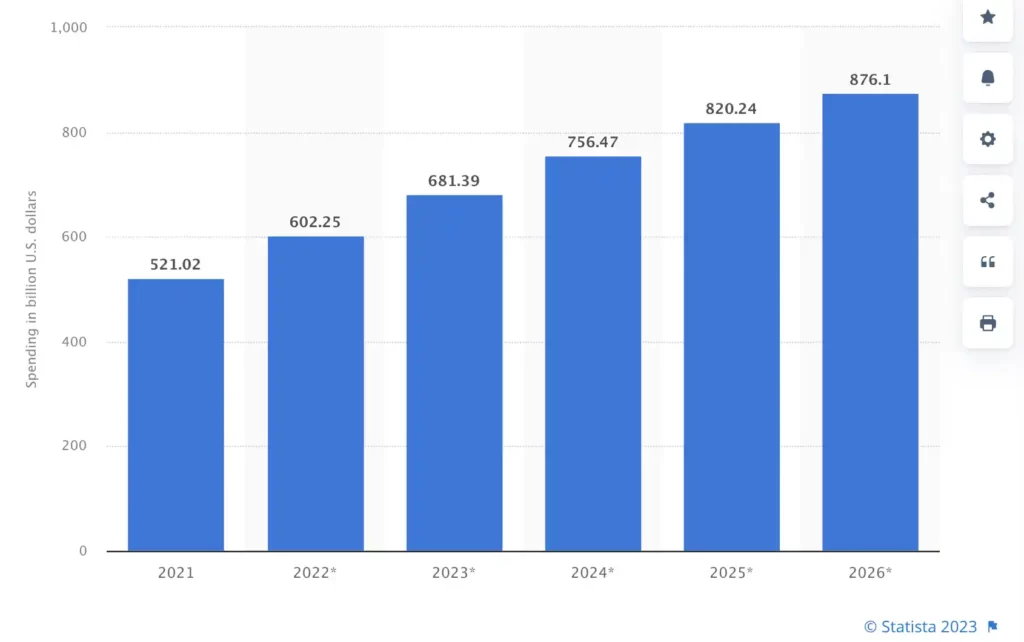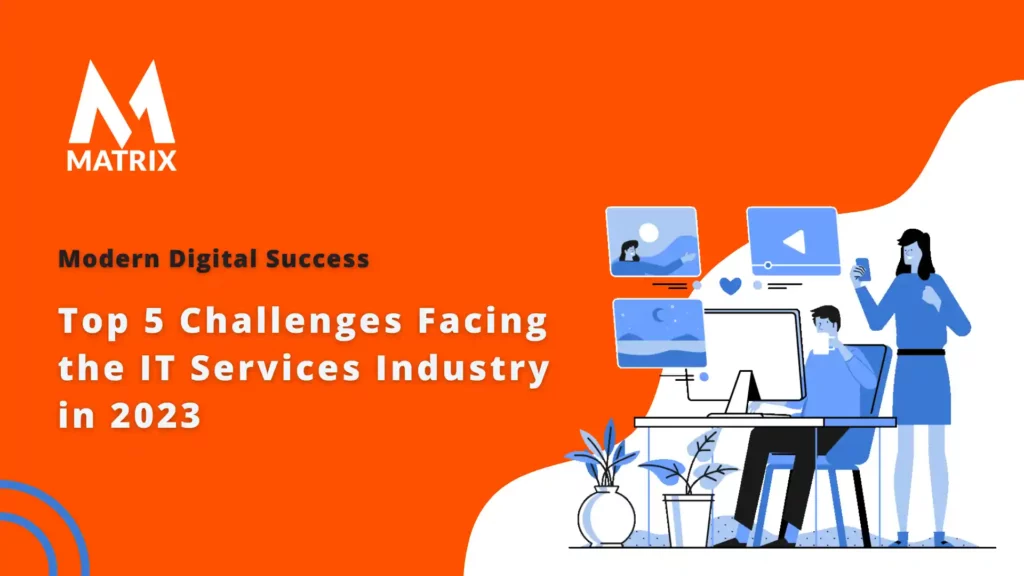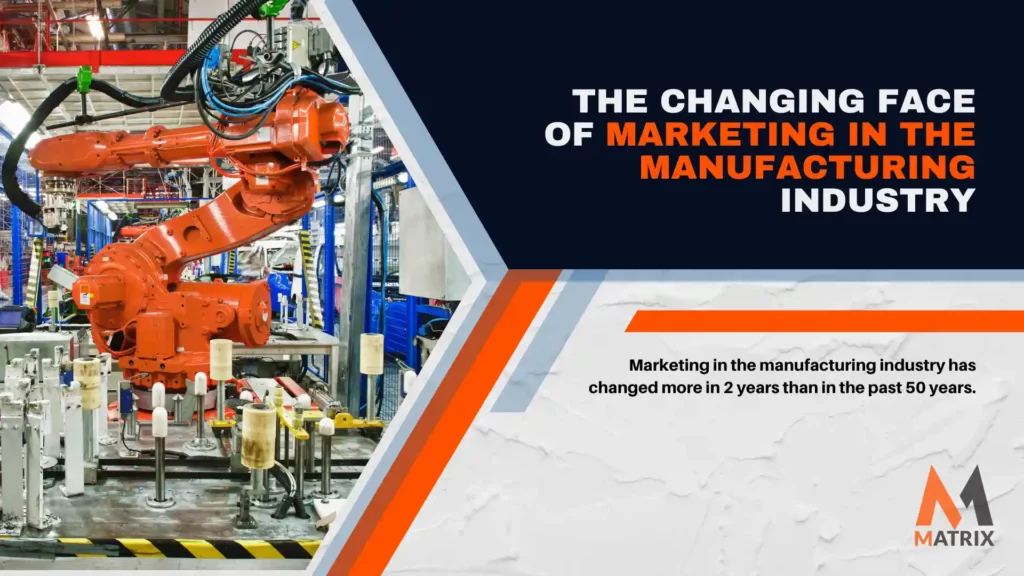Top 5 Challenges Facing the IT Services Industry in 2023
The looming top 5 challenges facing the IT services industry in 2023
The IT services industry constantly evolves as businesses become increasingly digital, and the need for reliable and secure technology solutions increases. In 2023, IT service providers will face several challenges that could affect their business models.
What are the key challenges facing IT professionals with massive layoffs in the tech sector?
From increasing competition to cybersecurity threats, cloud computing adoption to AI integration, and data privacy regulations to emerging technologies – these five key areas are set to shape the future of the IT services industry in 2023 and beyond.
In this blog post, we’ll explore these challenges and discuss possible solutions so businesses can stay ahead of the curve in an ever-changing tech landscape. Let’s get started!
Are you an IT services provider looking for ways to stay ahead of the competition?
As technology advances, so does the need for reliable and secure solutions. In 2023, IT service providers will face several challenges that could affect their business models.
From increasing digital competition to cybersecurity threats, cloud computing adoption to AI integration, and data privacy regulations to emerging technologies – these five key areas are set to shape the future of the IT services industry in 2023 and beyond.
With this knowledge, businesses can stay ahead of the curve by digitizing their business model and implementing new strategies that take advantage of current trends. By doing so, they’ll be able to remain competitive in a rapidly changing tech landscape.
Please read our blog post to learn more about how to stay ahead of your competitors with innovative solutions!
Digital marketing continues to be one of the most effective marketing strategies for businesses in the 21st century. In 2022, digital marketing spending was estimated to reach $272 billion worldwide, with businesses leveraging various techniques to reach their audiences.
This included search engine optimization (SEO), social media marketing (SMM), content marketing, display advertising, email marketing, and more.
Search engine optimization significantly increased in 2023, accounting for 46% of digital ad spending. Companies invested heavily in SEO campaigns to ensure their websites appeared higher up the list when potential customers searched online. SMM was also popular, allowing companies to target specific demographics and intuit consumer behavior.

Content Marketing accounted for 20% of digital ad spend in 2022 and focused on creating engaging content that promoted brand awareness and drove conversions.
Email Marketing remained popular due to its cost-effectiveness and measurability; it accounted for 8% of digital ad spending in 2022. Display advertising also saw an uptick due to its ability to target audiences based on interests and location accurately.
Regarding emerging technology trends, AI-driven chatbots also gained traction; they enabled businesses to communicate with customers faster and more efficiently than ever before.
Video streaming services grew rapidly in popularity, too, allowing brands to create interactive experiences that engage viewers with video content instead of static images or text-based ads. Furthermore, voice search technology continued its growth trajectory as customers increasingly favored voice commands over typing out queries or requests on their devices.
As we move into 2023, we can expect digital marketing spending to continue increasing at an impressive rate and the development of new technologies that will revolutionize how businesses reach their audiences online.
CEO offering IT services about the lack of a digital business model

CEOs must stay at the forefront of digital innovation in the ever-evolving IT services industry to remain competitive and ensure their business models are up to date. Unfortunately, many CEOs need more skills to build a digital business model effectively and need help to keep up with emerging technologies. This can create major problems for an IT services company if they fail to implement new strategies and solutions that support digital transformation.
Digital transformation is using technology to improve processes such as marketing, customer service, and product development. Companies can increase efficiency, reduce costs, develop new products and services, and increase customer satisfaction through this process.
Unfortunately, many businesses need to pay more attention to adopting new technologies to help them take advantage of these opportunities. Without a digital business model, CEOs may be unable to keep pace with the competition due to outdated approaches or insufficient resources.
Furthermore, businesses risk becoming exposed to cyber threats if their network infrastructure is not set up correctly or updated with security measures such as encryption technology or multi-factor authentication methods. Many CEOs need help building a secure IT system due to limited knowledge or resources; this could leave their companies vulnerable to costly data breaches or other cyber attacks that can severely disrupt operations.
Finally, without adequate data privacy regulations – such as GDPR compliance – businesses risk having confidential consumer information exposed without consent. This can lead to significant fines from regulatory bodies and irreparable damage to a company’s reputation; therefore, it’s important for CEOs in IT services industries to abide by international laws regarding data protection policies.
Increasing Digital Competition – How to Adapt and Remain Competitive
The increasing digital competition in the IT services industry is a major challenge that businesses must be aware of. With many companies now vying for the same customers, it is crucial to stand out from the competition and maintain a competitive edge. Adopting new technologies can be instrumental in helping businesses stay ahead of the curve, but it’s also important to optimize existing strategies.
Digital marketing is essential for businesses looking to build brand awareness and engage with their target audience. Businesses should invest in content marketing campaigns that create quality, engaging content that resonates with their target audiences and drives conversions.
They should consider utilizing display ads or email marketing designed to reach specific customer segments accurately. AI-powered chatbots are also effective for improving customer service as they enable businesses to respond quickly to inquiries without manual intervention.
Voice search technology presents another opportunity for businesses to leverage their existing digital marketing efforts; businesses can optimize their websites and other online content for voice search by using keywords correctly and targeting long-tail phrases, which might be more commonly used in vocal searches.
Video streaming services have likewise become increasingly popular; companies should create interactive experiences with compelling video content that encourages viewers to take action instead of passively consuming information.
AI integration into existing business processes can help streamline operations and improve efficiency significantly. Businesses should explore how AI can be applied in customer service, product development, supply chain management, website optimization, sales forecasting, and more.
By automating repetitive tasks or complex decisions related to these operations, AI technology can free up time that employees can use more productively on higher-value tasks.
Data privacy regulations must also be considered when implementing new technologies; this includes GDPR compliance which mandates how companies collect, store, process, access, and protect personal data from unauthorized parties.
Companies must ensure they adhere strictly to these guidelines or risk hefty fines from regulatory bodies or irrevocable damage to their reputation among customers due to data breaches or other cyber attacks due to inadequate security measures being implemented on networks or systems connected with the company’s IT infrastructure.
Overall, staying ahead of the ever-evolving IT services industry requires a combination of strategic investments in emerging technologies coupled with optimization of existing digital marketing strategies such as SEO optimization and email campaigns; furthermore, it involves understanding and adhering closely to data protection policies so as not risk any security breaches or violations that could threaten consumer trust or result in hefty fines from regulatory bodies.
By taking these steps proactively, companies will have an advantage over competitors who rely solely on outdated approaches instead of adapting swiftly and embracing innovation for greater success moving forward.
Cybersecurity Threats – Strategies for Keeping Data Secure

Cybersecurity threats are a major challenge for the IT services industry, and companies must be proactive in protecting their data from malicious attackers. Companies should prioritize investing in cyber security solutions that protect their networks and systems against malicious attacks. Implementing strong security measures is essential for protecting sensitive information such as customer data, financial records, confidential documents, etc.
The most common threats include phishing scams, ransomware attacks, malware infections, and distributed denial of service (DDoS) attacks. Hackers can use these methods to gain access to corporate networks or steal confidential information.
It’s important to have an effective strategy to defend against these attacks; companies should invest in firewalls and antivirus software that monitor traffic on the network and detect signs of suspicious activity. Additionally, they should consider implementing two-factor authentication, which requires users to provide multiple identifying information before accessing systems or data.
Another important security practice is regularly patching vulnerable applications or operating systems with the latest updates; this helps prevent hackers from exploiting known vulnerabilities in older versions of programs and operating systems.
Companies should also consider using encryption technology that scrambles data into unintelligible codes so that even if stolen by hackers, it cannot be accessed without a key decryption tool. Finally, organizations should develop an incident response plan that outlines procedures for detecting, responding to, and recovering from a breach to minimize any disruption caused by an attack.
There are many strategies businesses can implement to protect their data from cyber threats; these include investing in robust security solutions such as firewalls and antivirus software; implementing two-factor authentication for added protection; regularly patching vulnerable applications or operating systems with the latest updates; using encryption technology to secure sensitive data; and developing an incident response plan, so they know exactly what steps need to be taken when a breach occurs.
By taking these measures proactively, businesses will be better prepared against potential cyber threats and minimize any disruption caused by malicious attackers.
Cloud Computing Adoption – Leveraging the Benefits of the Cloud
Cloud computing adoption is becoming increasingly popular among businesses of all sizes as they look to leverage the numerous benefits that the cloud offers. With cloud computing, businesses can access an array of on-demand services and resources, eliminating the need for expensive hardware, software, and storage solutions. By using cloud services, companies can increase their agility and responsiveness while reducing costs associated with IT operations.
One of the biggest advantages of cloud computing is scalability; companies can quickly scale up or down without needing to invest in additional hardware or workforce. This flexibility enables them to adjust their capacity based on demand or fluctuating workloads. Cloud computing services are also highly secure since data is stored remotely in a secure data center instead of on-premise systems, which can be vulnerable to malicious attackers.
Additionally, businesses can benefit from the cost savings associated with cloud services; by relying on third-party providers for their computing needs, companies don’t have to invest in expensive hardware and software solutions that can quickly become obsolete. Additionally, many cloud solutions offer pay-as-you-go models, which allow customers only pay for what they use without any long-term commitment or contracts.
Another key advantage of using cloud computing solutions is increased collaboration opportunities; with cloud solutions such as Google Drive and Dropbox, teams can easily share documents and collaborate seamlessly from anywhere in the world. This makes it easier for teams to work together more efficiently on projects regardless of location or device used.
Finally, cloud solutions also offer various analytics tools, which makes it easier for companies to monitor usage patterns and track performance metrics such as customer engagement and website visits; this helps them gain valuable insights into customer behavior, so they can make informed decisions about how best to target those customers with marketing messages or product offerings that meet their needs.
As businesses embrace digital transformation initiatives and shift operations onto the cloud, leveraging its numerous advantages will be essential for staying ahead of competitors while remaining agile enough to respond effectively to changing market conditions. Implementing a comprehensive strategy around cloud adoption will help companies maximize efficiencies while minimizing costs associated with IT operations.
AI Integration – Exploring Automation Solutions for Businesses
AI integration is becoming an increasingly important aspect of the IT services industry as businesses seek to stay ahead of the competition in an ever-evolving world. As AI technology has become more advanced, it has allowed for more automation solutions that can help streamline processes and optimize business efficiency.
Automation solutions include anything from predictive analytics to robotic process automation, machine learning algorithms, natural language processing, and more.
The use of AI-driven automation solutions helps businesses save time and money by minimizing manual labor costs associated with completing tedious or time-consuming tasks.
Automated systems are often better equipped to analyze large volumes of data quickly and accurately than humans. This allows companies to gain insights faster and make decisions based on real-time information that can drive their business objectives forward.
Beyond cost savings, many AI automation solutions also provide a competitive advantage for businesses through improved customer experience and service delivery. Automated customer service chatbots enable customers to reach out with inquiries anytime they need assistance.
At the same time, natural language processing algorithms deliver accurate responses in a fraction of the time it would take a human employee. In addition, predictive analytics tools leverage historic data points to anticipate customer needs before they even think to ask for them – creating a level of personalized service that customers are more likely to be satisfied with.
There are several key considerations when implementing AI automation solutions into a business environment – such as cost, technical complexity, and security risks associated with the technology being used. It is important for organizations looking to adopt these technologies to ensure that the technology being used is compatible with their existing infrastructure and complies with any regulatory requirements in place. Furthermore, organizations must train their employees on how these new technologies work so everyone can be comfortable using them.
As the IT services industry continues to evolve towards greater levels of digitalization, businesses must be proactive in leveraging innovative technologies like AI-driven automation solutions if they want to remain competitive in this rapidly changing landscape.
By investing in appropriate training resources and exploring different options, today’s businesses can utilize these powerful tools to improve customer experiences while simultaneously reducing operational costs – enabling them to stay ahead of the curve now and into the future.
Data Privacy Regulations – Understanding Compliance Requirements

Data privacy regulations are becoming increasingly important for businesses in the IT services industry to be aware of to remain compliant and competitive. As technology continues to evolve, so do the laws governing data privacy. Companies must stay up-to-date on their respective country’s privacy laws and ensure they have appropriate measures to protect customer information.
Data privacy is a complex and ever-changing topic, making ongoing compliance difficult for many organizations. There are several components to understanding data protection regulations, such as knowing what types of customer data should be collected, how it needs to be stored, who has access to it, and when it can be shared or sold. Additionally, businesses must understand how customers will be notified if any changes are made to their personal data or if the company experiences a security breach.
The General Data Protection Regulation (GDPR) is one of the most widely adopted data protection laws worldwide and requires companies that process or store EU citizens’ data to adhere to specific standards for security and transparency around how customer information is handled.
This includes collecting consent from users before collecting or storing their information and having an opt-out option for them if they so choose. It is also important for companies operating under GDPR to have processes in place that allow users to access their personal data upon request, delete their information upon request, and update any inaccurate personal information they may possess.
In addition to GDPR compliance, companies must consider any state or federal regulations within their own country when assessing customer data privacy standards. For example, The California Consumer Privacy Act (CCPA) was passed into law in 2018 with similar requirements as GDPR and applies only within California borders. This means that businesses operating within this state must comply with certain standards when handling user data – including providing consumers with clear notice of what information is being collected about them and allowing for opt-outs where applicable.
Staying compliant with the ever-evolving world of data protection can be a challenge for many organizations – especially those dealing with large volumes of customer information regularly. Companies must ensure they have implemented policies that keep up with changing regulations and prioritize keeping user data secure at all times.
Emerging Technologies – Taking Advantage of New Trends in Technology

The IT services industry is constantly evolving, and emerging technology trends are becoming increasingly important for businesses to stay competitive. Companies must be aware of the latest technological advancements and embrace them to remain competitive in the ever-changing digital landscape.
Cloud computing is one major trend that has been gaining more traction over recent years. It enables businesses to store their data on remote servers rather than within their premises. This allows organizations to access data quickly and easily while reducing operational costs – enabling them to remain agile and flexible in their operations.
Cloud computing solutions can offer improved scalability, reliability, and cost savings – enabling companies to boost efficiency while providing better customer experiences. AI integration is also becoming popular within the IT services industry, allowing organizations to automate mundane tasks and streamline processes for greater efficiency.
By leveraging AI-driven tools, companies can increase customer engagement by understanding customer needs better – allowing them to personalize product offerings and deliver tailored solutions for greater satisfaction.
In addition to cloud computing improvements and AI integration, virtual reality (VR) has become an important emerging technology within the IT services sector. VR allows users to immerse themselves into a simulated world where they can experience different scenarios in a safe environment. Organizations are already utilizing this technology in various ways, such as training new employees or offering virtual tours of real-world locations for customers, allowing them to understand better what’s on offer without having to visit a site physically.
IoT sensors enable organizations to collect valuable insights from user behavior patterns, which can be used for improved decision-making.
New technologies are also emerging that enable businesses to leverage blockchain technology for increased transparency around data management and transaction processing. These innovative technologies provide opportunities for businesses operating within the IT services sector, allowing them to stay ahead of the curve in digital transformation efforts.
Conclusion
In conclusion, it is essential for CEOs running IT services companies to adopt a comprehensive digital business model that considers all five key areas mentioned earlier: increasing digital competition, cybersecurity threats, cloud computing adoption, AI integration, and data privacy regulations.
Challenges faced by the service industry are similar to that of the information technology issues and challenges
By doing so they will be able to position their organization ahead of its competitors while keeping their customers safe from potential cyber threats or data breaches – something no CEO should take lightly!
How Matrix Marketing Group can help IT Services Industry
Matrix Marketing Group, a leading digital marketing agency, provides comprehensive services to the IT services industry, enabling organizations to stay ahead of the rapidly evolving digital landscape. Our specialized team of experts combines cutting-edge data science capabilities with creative and strategic marketing solutions to ensure that businesses in the industry can stand out from their competition and remain competitive in the ever-changing world of technology.
Our data-driven approach allows us to gain deep insight into customer behavior and needs – enabling us to develop personalized product offerings that meet customer demands exactly. We use AI-driven tools and automated processes to deliver tailored customer experiences, allowing our clients to provide exceptional service with minimal effort – this is crucial for staying competitive in today’s crowded market.
We also have extensive experience helping our clients leverage cloud computing platforms such as Amazon Web Services or Microsoft Azure. Our team will work closely with your organization’s IT department to assess your current infrastructure, develop an optimized cloud strategy, and deploy it quickly and cost-effectively.
With cloud computing solutions, you can scale up or down depending on demand while saving money on costly hardware investments – this makes it easy for businesses in the IT services industry to remain agile and responsive without sacrificing performance.
In addition, Matrix Marketing Group can help your business leverage virtual reality (VR) for better customer engagement. Our team has extensive experience developing customized VR applications that provide immersive experiences tailored specifically for IT service users.
With these applications, you can offer virtual tours of physical locations or training sessions within a safe, simulated environment – something no other marketing agency provides! Challenges faced by service industry are the same.
Finally, we leverage blockchain technology for increased transparency around transactions and data management processes. By utilizing IoT sensors connected across multiple devices, we can collect valuable insights from user behavior patterns, allowing our clients to make more informed decisions while providing safe transactions between them and their customers. Don’t let unsolved problems in technology kill your company.
At Matrix Marketing Group, we understand how daunting it can be to keep up with the ever-evolving world of technology; however, our experienced team is here to help you stay ahead of the curve through comprehensive digital solutions tailored specifically for businesses operating within the IT services space. Contact us today so we can work together towards success!
General FAQs
How do cloud computing platforms benefit businesses in the IT services industry?
Cloud computing platforms provide businesses in the IT services industry with an efficient and cost-effective way to store, access, and deploy data. With cloud computing solutions, businesses can quickly scale up or down depending on demand while saving money on costly hardware investments.
What role does data science play in staying ahead of competitors?
Data science is critical in helping businesses stay ahead of the competition. Data science enables companies to gain a deeper understanding of their customer’s behavior and needs, allowing them to develop personalized product offerings that meet customer demands exactly.
How can businesses remain competitive in an ever-changing technology landscape?
Businesses can remain competitive in an ever-changing technology landscape by leveraging digital marketing services to optimize their business models, utilizing cloud computing platforms for efficient data storage, developing custom VR applications for better customer engagement and leveraging blockchain technology for increased transparency.
What are the top 5 challenges facing the IT services industry?
The IT services industry constantly evolves, with new challenges arising every year. The top 5 challenges facing the IT services industry in 2023 are increasing digital competition, cybersecurity threats, cloud computing adoption, AI integration, and data privacy regulations.





